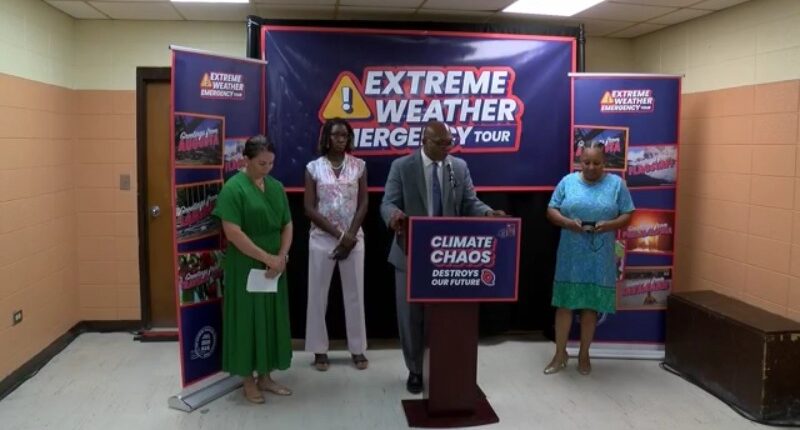Share this @internewscast.com

AUGUSTA, Ga. ()- State and local leaders gathered in Augusta Wednesday talking about climate change.
They’re calling on lawmakers to take action after rising costs and damage from extreme weather across the country.
This is part of the Extreme Weather Emergency Tour.
Officials have been visiting locations in Arizona, Michigan, and Pennsylvania, with Augusta being their latest destination to tackle the challenges of climate change and stress the urgency for intervention.
Nearly 11 months since Hurricane Helene, Augustans are still seeing the impact—and they say there’s still work to do.
“Just this recent weekend, I went kayaking with my family on the Canal, and the experience was nearly thwarted. Fallen trees and storm wreckage still clog the waterways, even after nearly a year since the storm,” shared Traci George, a community advocate.
Community leaders joining State Senator Harold Jones about the costly damage from climate change.
Local organizations like the Savannah Riverkeeper have responded, but they say the resources are limited.
“Our resources are already stretched to their limits by daily needs in this region. When climate-related weather events occur, it’s like getting hit by a freight train,” stated Cassandra Loftlin.
That’s why they’re raising concerns.
The Trump administration is proposing cuts to climate protections and federal agencies like FEMA.
This is happening while fires persist in California, and floods have severely impacted areas throughout the nation, including Texas, Wisconsin, and the nearby Mount Pleasant, South Carolina.
They’re calling on lawmakers to protect valuable federal programs.
“NOAA, NASA, FEMA, the National Weather Service—these aren’t examples of government waste. These organizations safeguard us, so we must support them,” expressed Paige Brockmeyer, a registered nurse and local military spouse.
Georgia Senate Minority Leader Harold Jones says he’s already having conversations with delegates at the state level about this.
He says if something isn’t done, lawmakers may need to reach into their own pockets to prepare for the worst.
“These occurrences are already beginning. The ambiguity surrounding FEMA and federal funding needs resolution. Concurrently, at the state level, we might have to increase investments, particularly concerning cleanups, given the current administration. It’s evident now that we might not receive complete federal support,” stated Jones.
President Trump has said FEMA could be eliminated as early as this December.
We reached out to Congressman Rick Allen’s office to get his thoughts on the situation, and we’re waiting to hear back.











